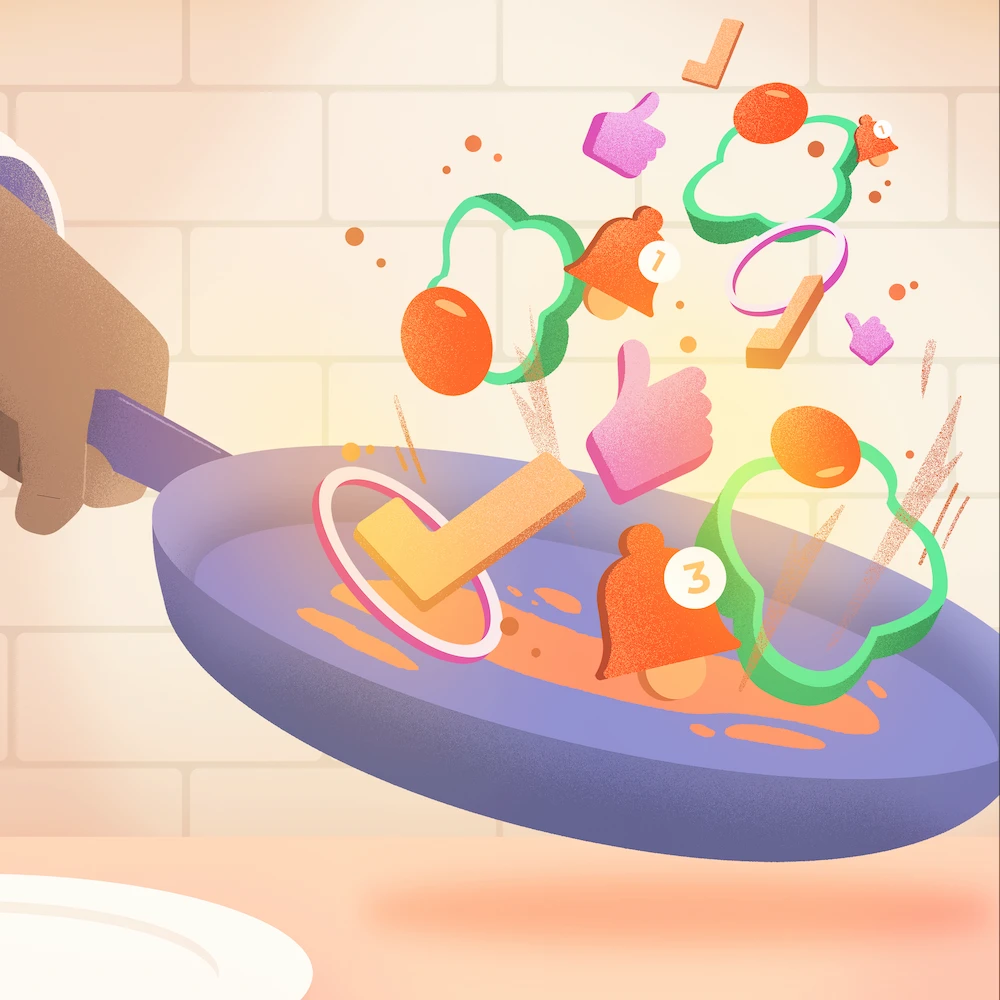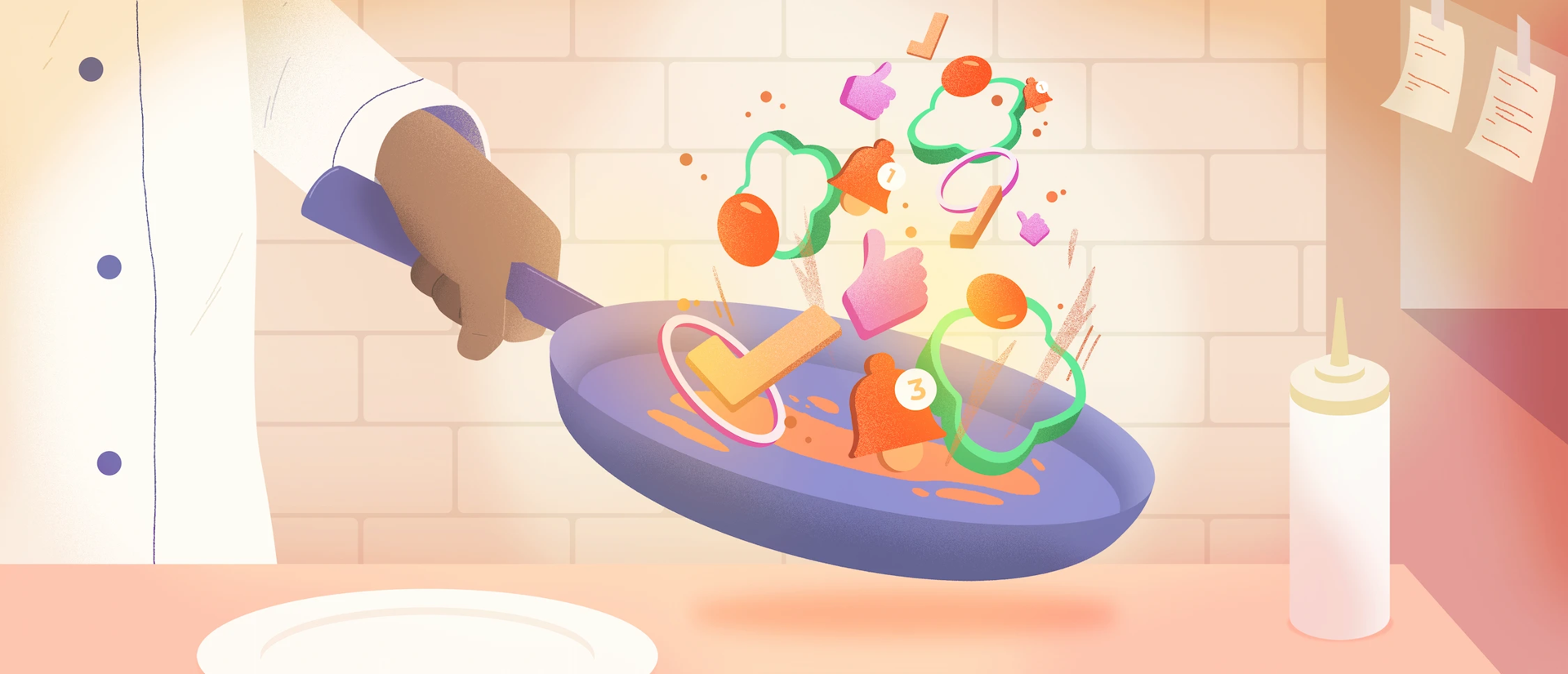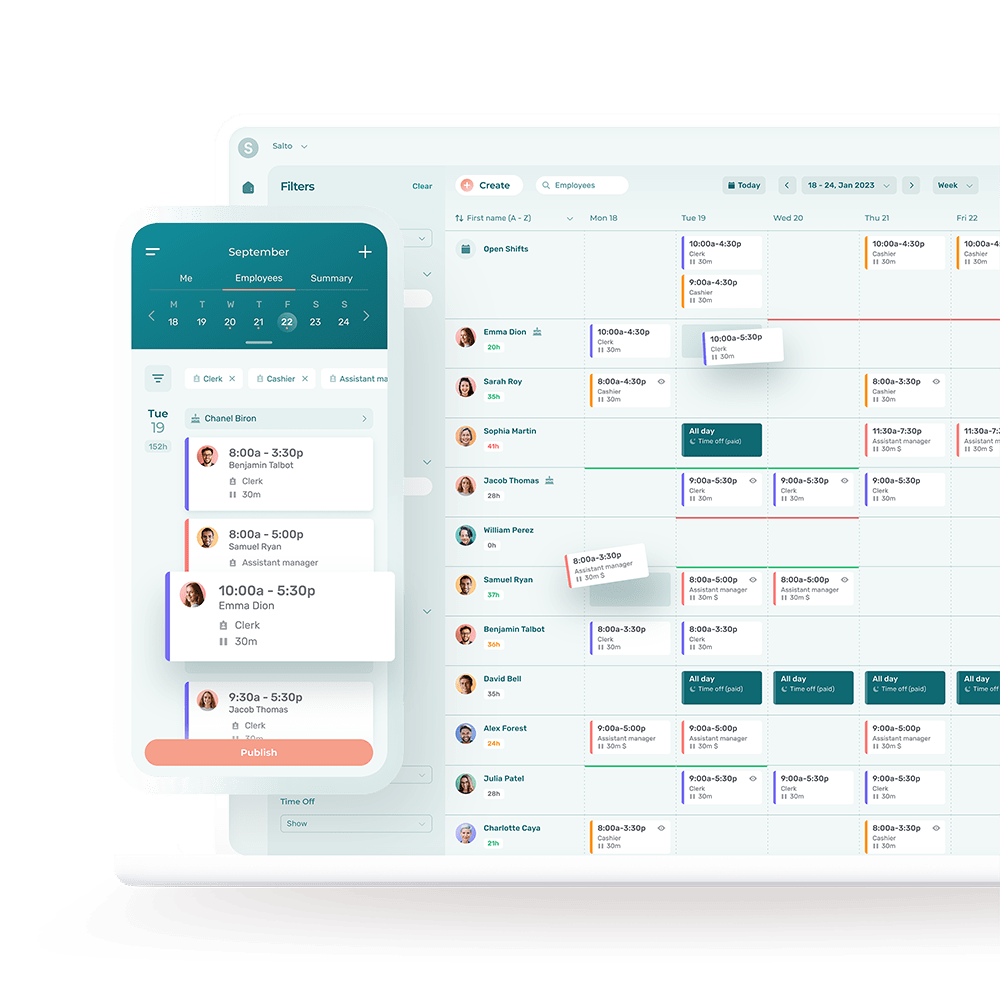To offer customer service that stands out from the competition, restaurants need to build a strong team.
This team has many tasks and responsibilities to perform in order to achieve the desired results. Each position in a restaurant is therefore of great importance, since the quality of service depends on each of them.
As a manager, you need to understand each of your roles so that you can create efficient work schedules, deliver an engaging customer experience and ensure the success of your establishment.
In this article, you will learn:
- Positions of restaurant employees: front of house, back of house, manager
- A restaurant manager’s job description
- A chef’s job description
- A cook’s job description
- A waiter’s job description
- A host’s job description
- A bartender’s job description
- How to simplify restaurant scheduling
Restaurant Employees’ Positions
The different positions in a restaurant are numerous, and can vary greatly depending on the size of your establishment. Employees may wear many hats in smaller restaurants. For example, a waiter could also be trained as a bartender or host.
Generally speaking, employees can be divided into 3 categories: front of house, back of house and management.
Let’s take a closer look at the different roles or positions that restaurant employees can occupy.
Front of House
Front of house includes all employees who interact with customers on a regular basis, such as:
- Waiter or waitress
- Barman or barmaid
- Host or hostess
- Sommelier
- Busser, busboy or busgirl
- Barista
- Security guard
- Delivery assistant
Back of House
The back of house includes all employees who are not in direct contact with customers, such as:
- Head cook
- Sous-chef
- Cook
- Dishwasher
- Pastry chef
- Runner
- Cleaning and maintenance worker
Management Positions
The management team manages operations and ensures the smooth running of activities, although some of them may also be more “hands on” and find themselves helping employees on the floor.
Management positions include:
- Restaurant manager
- Assistant manager
- Floor manager
- Marketing manager
- Event planner
- Accountant or other administrative function
- Inventory manager
List of Tasks for Restaurant Employees
As a manager, it’s important to have a clear understanding of the different positions of your team members, and the tasks and responsibilities that go with them. This will make it easier for you to create balanced, realistic work schedules, easily recruit new employees and better plan your workforce needs.
💡The following sections can be used as job offers for recruitment. Feel free to use them as inspiration!
Restaurant Manager
The job of restaurant manager can vary greatly from one establishment to another. Generally speaking, the manager is responsible for ensuring the smooth running of daily operations, the quality of service and food offered and the restaurant’s profitability.
For this kind of position, managers often need to have a degree in management, administration or hotel management, or sufficient experience. They must also have the necessary training in occupational health and safety, as well as food safety.
Qualities of a good restaurant manager
Good restaurant managers typically possess the following qualities:
- Leadership: inspiring and motivating team members
- Communication: interacting effectively and professionally with team members and customers
- Management: to create work schedules and monitor budgets and inventory
- Problem-solving skills: ensuring rapid decision-making and finding viable solutions to problems
- The ability to offer good customer service: knowing how to handle customer complaints, offering good service
- Time management: creating efficient work schedules, prioritizing tasks, etc.
Key challenges of restaurant managers
Being a restaurant manager also brings its share of challenges:
- Managing staff: finding replacements, managing conflicts, evaluating employee performance, planning appropriate training, providing feedback, recognizing employees’ good work, etc;
- Ensuring good customer service: handling unforeseen events, responding to customer complaints, assisting the service team as needed, etc.
- Ensuring the restaurant’s profitability: good inventory management, monitoring labor costs, creating profitable promotions that attract customers, etc.
List of tasks for a restaurant manager
A manager’s tasks include:
- Overseeing day-to-day operations and the smooth running of the business
- Creating and managing work schedules: approving time off requests, finding replacements when needed, modifying schedules as required, etc.
- Hiring, managing and training staff: creating recruitment ads, creating training programs, conducting performance reviews, helping employees resolving conflicts, conducting one-on-one meetings, etc.
- Managing customer complaints and satisfaction: responding to reviews left on the Web, ensuring quality of service, responding to customers in the restaurant if necessary, etc.
- Complying with existing regulations: respecting labor laws, health and safety standards, food safety rules, ensuring cleanliness of the workplace, etc.
- Developing and implementing strategies to ensure the restaurant’s profitability: managing labor costs, making budgets and ensuring they are respected, developing marketing strategies to attract more customers, etc.
- Organizing and managing events: promoting them, coming up with relevant ideas, making sure they run smoothly, etc.
Head Chef
The head chef is responsible for creating the menu, ensuring the quality and presentation of dishes, managing kitchen team members, controlling costs and managing food inventories. The head chef must also ensure compliance with hygiene, cleanliness and sanitation standards, as well as occupational health and safety standards.
The training required is usually professional training at a cooking school. Most restaurants also require many years’ experience as a cook or sous chef in other restaurants.
Qualities of a good head chef
The qualities of a good chef include:
- Creativity
- Leadership
- Attention to detail
- Flexibility
- Organizational skills
- Passion
- Ability to work in a team
- Good stress tolerance
Key challenges of head chefs
A chef’s main challenges include:
- Managing staff: recruit and train employees
- Adapting menus according to seasons and customers’ dietary preferences and constraints
- Working under pressure
- Minimizing monetary losses and food waste
List of tasks for a head chef
A chef’s list of tasks includes:
- Creating and updating menus according to seasons and customer preferences
- Ensuring proper inventory management and rotation
- Managing kitchen staff
- Maintaining the quality of dishes during service
- Ensuring kitchen cleanliness and compliance with food standards
- Taking inventory and placing orders
- Budgeting
- Developing new dishes
- Improving existing processes
Cook
Cooks are responsible for preparing meals according to recipes predetermined by the chef, including food preparation, cooking and plate assembly. The cook’s supervisor is the head chef or sous-chef.
The training required to become a cook is typically vocational. Some restaurants may also train their employees themselves, requiring no training whatsoever beyond a high school diploma.
Qualities of a good cook
The qualities of a good cook include:
- Basic knowledge of and interest in cooking
- Ability to work as part of a team
- Attention to detail
- Ability to work under pressure
- Cleanliness
- Communication skills
Main challenges of cooks
A cook’s main challenges include:
- Working in a stressful environment
- Ability to multitask
- Communicating effectively
- Working in sometimes difficult conditions
List of tasks for a cook
A cook’s to-do list includes:
- Preparing food for service
- Cleaning and maintaining kitchen facilities
- Cooking meals and putting together plates
- Operating various kitchen appliances (oven, stove, fryer, etc.)
- Respecting health and safety standards
- Ensuring proper cooking of food
- Ensuring proper stock rotation
- Communicating with waiters regarding customer requests
Waiter or Waitress
Waiters and waitresses are responsible for taking customer orders, serving food and ensuring customer satisfaction. They also advise customers on their needs and answer any questions they may have.
Most restaurants do not require a specific diploma for the position of waiter. However, some gastronomic establishments do require professional training. Generally speaking, waiters have prior experience in the restaurant business as a busboy (or busgirl), host (or hostess) or bartender (or barmaid).
Qualities of a good waiter
The qualities of a good waiter are:
- The ability to provide good customer service
- Communication skills
- Ability to work under pressure
- Attention to detail
- Organizational skills
- Ability to work as part of a team
- Good memory
- Physical fitness
Key challenges of waiters
The main challenges of the server role include:
- Managing time appropriately
- Managing emotions in stressful situations
- Managing customer complaints
- Ensuring prompt service
- Knowing how to prioritize tasks
- Working as part of a team
List of waiter tasks
A server’s task list includes:
- Greeting customers and bringing them menus
- Explaining the menu to customers
- Advising customers on dishes and beverages
- Taking orders without making mistakes
- Ensuring that dietary constraints or customer requests have been respected
- Serving several tables at the same time
- Ensuring customer satisfaction
- Preparing tables before service begins
- Clearing and cleaning tables between customers
- Polishing utensils
- Charging customers
- Using POS software to place orders
- Collaborating with other team members, including cooks
- Maintaining restaurant cleanliness
- Handling customer complaints in a professional manner
- Opening and closing cash registers
Host or Hostess
The host is usually the first point of contact with customers. The host welcomes guests, leads them to their table and takes reservations. In some cases, they may also be responsible for charging customers.
There is generally no formal training required to work as a host or hostess, although a high school diploma is sometimes required. Some restaurants prefer candidates who already have experience in the restaurant industry or in customer service.
Qualities of a good restaurant host
The qualities of a good host include:
- The ability to provide good customer service
- Communication skills
- Problem-solving skills
- Patience
- Courtesy
- Speed
- Ability to work as part of a team
Key challenges of restaurant hosts
The main challenges of the host role include:
- Managing customer complaints
- Working as part of a team
- Managing customer expectations
- Multi-tasking
List of restaurant host tasks
The list of host tasks includes:
- Greeting customers
- Taking reservations
- Assigning tables to customers
- Working as part of a team with waiters and cooks
- Answering customers’ questions
- Helping waiters prepare tables as needed
- Maintaining restaurant cleanliness
- Handling customer complaints
- Assisting other employees as needed
- Opening and closing cash registers
- Charging customers
- Polishing utensils
- Filling condiments, if applicable
Bartender
The bartender prepares the drinks in a restaurant. They are sometimes also called mixologists.
There is generally no formal training required for this position, although a high school diploma is sometimes required. Some restaurants prefer candidates who already have experience in the restaurant industry or in customer service. Many establishments train their own staff.
Qualities of a good bartender
The qualities of a good bartender include:
- Good communication
- Ability to work under pressure
- Ability to multitask
- Team work
- Organizational skills
- Creativity
Key challenges of bartenders
The main challenges of the bartending position include:
- Respecting customer requests
- Keeping the bar clean
- Refusing service to intoxicated customers
- Creating beverage menu
- Ensuring timely service
List of bartender tasks
A bartender’s to-do list includes:
- Recommending beverages to customers
- Creating beverage menu
- Respecting customer requests
- Taking customer orders
- Maintaining the cleanliness of the workplace
- Ensuring stock rotation
- Taking inventory
- Assisting other team members as needed
- Checking the age of customers and refusing service to those too intoxicated
- Opening and closing cash registers
- Charging customers
- Polishing glasses
Eliminate Scheduling Issues in Restaurants
To ensure that each employee is able to carry out their tasks properly, team members’ work schedules must be carefully planned.
That’s why many restaurant managers choose to use scheduling software like Agendrix. This allows them to centralize their management tasks in one place, and improve employee satisfaction.
For example, managers can access their employees’ availability and preferences directly in the scheduler to create the best possible schedule. Agendrix even lets you create schedules according to employee positions, making management tasks much easier.
When you make your schedules in Excel, the problem is that it’s easy to make mistakes.
– Étienne, General Manager, Bar Renard
Once the schedule has been finalized, managers can send it to employees, who receive it directly on their cell phones. They also receive a notification if their schedule is modified, which greatly simplifies communications.
If they want to swap one of their shifts, they can find their own replacement and submit their request to the manager, who can approve it in just a few clicks. It’s also easier to find replacements thanks to the open shifts.
As everything is now in one place, employees always communicate with us using Agendrix.
– Marilyn, Siboire restaurant manager
Finally, scheduling software also offers functions for tracking employee working hours and attendance. This way, managers know that their employees are in the right place at the right time.
What Are the Main Tasks of Restaurant Staff?
The main tasks of restaurant employees include:
- Greeting customers
- Advising customers on dishes and beverages to try
- Explaining the menu
- Preparing food
- Cooking and plating meals
- Maintaining cleanliness of the workplace
- Cleaning and setting up tables
- Providing outstanding customer service
- Working as a team to provide the best possible service
- Handling customer complaints
- Taking reservations
What Is the Average Salary of Restaurant Managers?
The average salary for restaurant managers varies according to the location and size of the business, the manager’s experience and other working conditions offered by the employer.
On average, restaurant managers in Canada earn $23.75 an hour, while in Quebec they earn $23.35 an hour.
In the United States, they earn an average of around $18.32 an hour.
What Is the Average Salary of Restaurant Chefs?
The average salary for head chefs varies according to the size of the restaurant, the chef’s experience and other working conditions offered by the employer.
On average, restaurant chefs in Canada earn $20.00 an hour, while in Quebec they earn $21.08 an hour.
In the United States, they earn an average of around $18.40 an hour.
What Is the Average Salary of Restaurant Cooks?
The average salary for a cook varies according to the size of the establishment, the employee’s experience and the working conditions offered by the employer.
On average, cooks in Canada earn $16.00 an hour, while in Quebec they earn $17.00 an hour.
In the United States, they earn an average of around $15.99 an hour.
What Is the Average Salary of a Waiter?
The average salary of a waiter varies according to the restaurant and its size, the employee’s experience and the other working conditions offered by the employer.
On average, waiters in Canada and in Quebec earn $17.00 an hour.
In the United States, they earn an average of around $15.00 an hour.
Note: total waiter wages can vary greatly depending on the amount of tips received.
How Much Does a Restaurant Host or Hostess Earn?
Hosts and hostesses are generally paid the minimum wage in the region where the establishment is located.
How Much Does a Bartender Earn?
The average salary of a bartender varies according to the restaurant and its size, the employee’s experience and the working conditions offered by the establishment.
The average bartender in Canada and Quebec earns $18.00 an hour.
In the United States, they earn an average of around $16.04 an hour.
Note: a bartender’s total salary can vary greatly depending on the amount of tips received.










